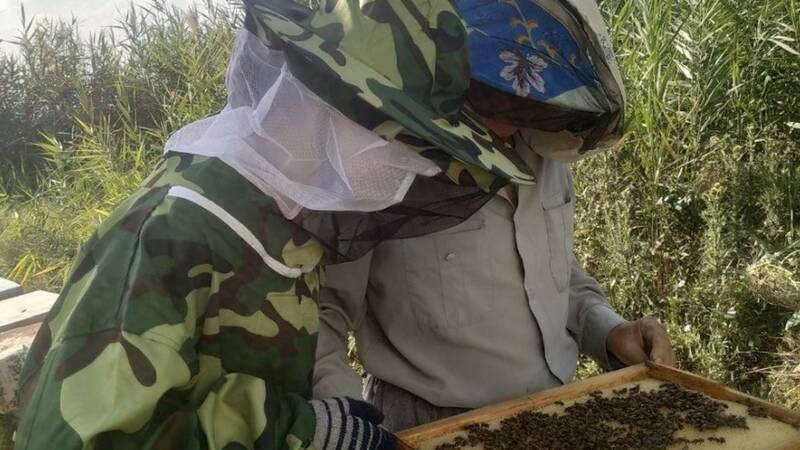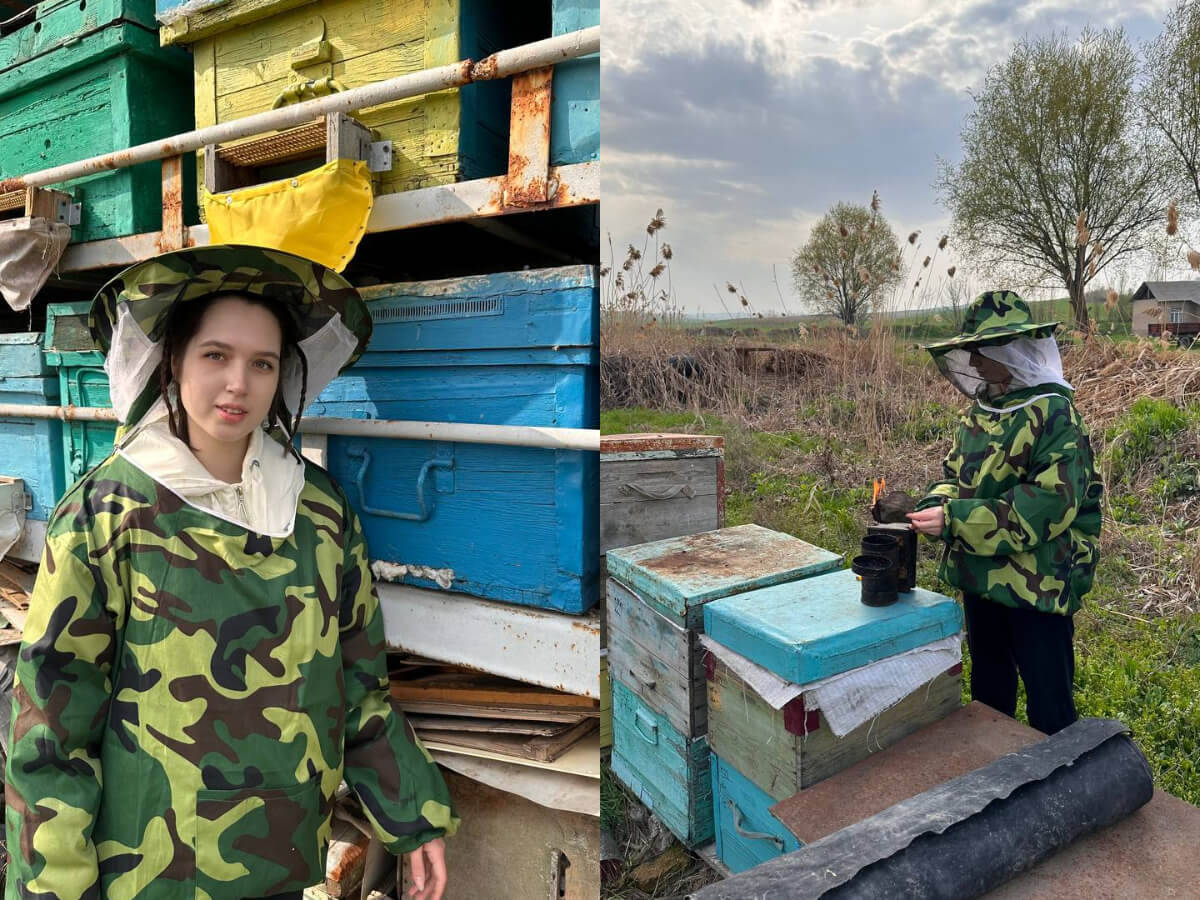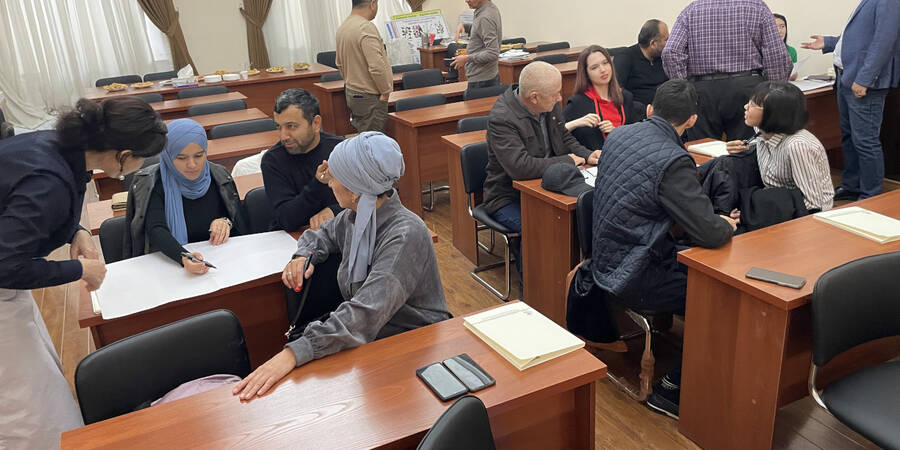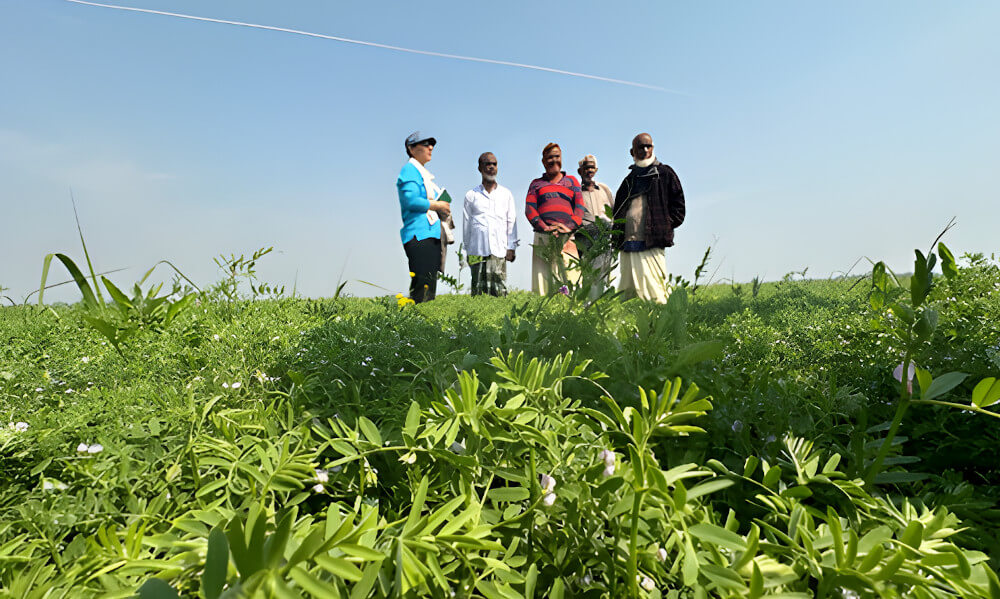Pooling intergenerational beekeeping knowledge

Since 2019, the AI-Driven Climate-Smart Beekeeping for Women project (AID-CSB) has worked with beekeepers in Uzbekistan and Ethiopia to localize and pilot a hive management app for more successful beekeeping and ecosystem strengthening.
Project activities to build digital literacy skills not only enable young women and rural beekeepers to use the app but helps them to equitably access resources and knowledge and visualize new and expanding opportunities in agriculture. The activities also position youth, with their familiarity with such technology, to help family members and older generations of farmers to expand the use and benefits derived from new digital technologies in agriculture.
To support app uptake and digital literacy skills, the project engaged women beekeepers in the app design process and provided smartphones and trainings to participating beekeepers. The project also created a Telegram group in which participating beekeepers exchange questions and information.
We spoke with two of the beekeepers participating in the project from Tashkent, Uzbekistan: Olga and her father, Sergey. As part of the next beekeeping generation, Olga and other young women utilize their digital skills to actively engage in agricultural activities and plan new entrepreneurial ventures while their elders hand down the tradition of beekeeping.

Beekeeping Origins & Practices
Q: Sergey, where did you learn beekeeping?
Sergey: From Olga’s mother—she comes from three generations of beekeepers! I started beekeeping as a hobby, then I worked in an apiary and started as a professional beekeeper in 1987. My father-in-law taught me all the skills and experience I needed to manage an apiary and provided me with equipment. So you could say I married into it.
We start our work at the end of winter—looking at the apiary, making inspections, and planning our work to restore the apiary, increase the number of bees, maintain devices and equipment, and arrange transportation. This is because in Uzbekistan, not all honey plants and flowers are in one place—one flower blossoms for a month, then we have to move the hives somewhere else, typically twice a year. The most interesting part is in spring when the bees are ready, so I go with Olga and my wife to the apiary and we collect pollen. This is just to make preparation for May harvesting—naturally the bees are working hard and collecting pollen first. Then we start the first harvesting of honey, and we also feel better at this time—like our health is improving. I always really look forward to this time of year.
Olga: It’s my favorite time to spend time with my family on the farm, its very important that they share their skills with me. Spring is my favorite season of the year—everything is being renewed. My challenge though is that I cannot be both at the apiary and university… so I can’t go to the apiary in spring as often as I’d like.
Q: How do you divide tasks in the springtime?
Sergey: I don’t want the bees to sting my wife and daughter so I do most of the inspections directly—the honeybees welcome me, crawling around me. Olga harvests the honey, cleans frames, collects propolis, and filters and bottles honey.
However, I did decide to give Olga 20 hives she can be fully responsible for, so she takes care of these and inspects them. If she has any questions she asks me and I answer based on my experience. I’m so happy that she’s interested in beekeeping—this has been our family tradition for generations and I don’t want the linkage to be broken.
Olga: My first memory of beekeeping was when I was seven years old, we spent the night at the apiary and I woke up to the buzzing noise of bees and it was so pleasant. We worked that day from sunrise to sunset and I really enjoyed the feeling— I was in pure nature and independent.
Sergey: My first memory was when you were two years old, you were visiting the apiary with your mother and you weren’t afraid of the bees! You were sitting there with a stick and playing with them, teasing them.

Technology Usage
Q: How do you use the HiveTracks application?
Olga: The application is very straightforward, but when we’re beekeeping we have sticky hands! So at the end of each day of work after washing up, we enter the information into the app together.
Sergey: Then in the morning when we start working, its very helpful to use the app to review everything we did the day before. The HiveTracks application is now our main notebook – all information is collected and stored there.
Olga: To help my father understand the app better I showed him how to register new colonies and note any diseases or pests. The app is very quick and convenient. To access important information on a disease for example, you just press a button.
Sergey: Using the app and smartphones helps us feel more connected to other beekeepers too —we can discuss and share all our beekeeping knowledge and questions. For example just today we spoke with beekeepers in Surkhandarya about how the bees fared over winter and how much food was consumed. Thanks to the internet we were even able to connect with beekeepers from abroad to purchase new queens.
Supporting beekeepers
Q: What support do you need most as beekeepers?
Sergey: Today, the climate is changing and heat is a big issue. Water is scarce, and plants do not grow as high as they used to because the sun dries them out. So we have to travel down from the mountainside to the valley and foothills, close to the crops that are irrigated, like clover and sunflower. There is a state program on restoration of mountainsides through planting trees, so we are grateful that the government is supporting beekeepers in this way.
I would like there to be some practical demonstrations, trainings, and knowledge and skills exchange with beekeepers from Europe and the US. We also need improvements to the equipment and technologies we use—for example most trailers we use to transport hives are 50-60 years old.

Looking ahead
Q: What are your hopes for the future of your beekeeping operation?
Sergey: Haha, I want to know this answer too!
Olga: I want to open a coffee shop and use and sell my honey there, so I don’t want to lose my links to the apiary, but I also don’t want to be a large-scale professional beekeeper.
Q: What are you most proud of as beekeepers?
Olga: I think we’re proud of our teamwork.
Sergey: We consider this profession to be very respectful & crucial to nature —pollination supports life and especially human beings! Without pollination, we wouldn’t be living on the earth. There would be no harvests—starting with most fruits and vegetables and ending with cotton and wheat. Honey harvesting is the gift of the bees, but their gift of life is even greater.
When we wake up in the morning, we just are thinking about bees, apiaries, and hives—how we can take care of our bees. For example, on a hot day, we immediately bring them water to them so that they don’t start looking for water in the heat; no one forces us, but we are doing it to give a gift back to them!
------------------------------------
Funded by the German Federal Foreign Office, the AID-CSB project was implemented by ICARDA MEL, HiveTracks, icipe, and the Holeta Bee Research Center. To learn more about the AID-CSB project, check out the final technical report and brief.



